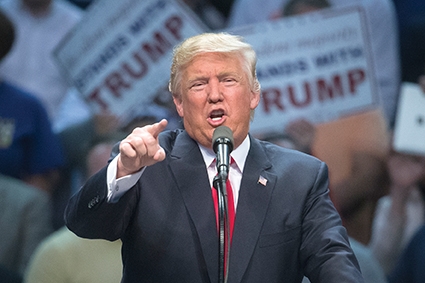Donald Trump at Crossroads: Good Cowboy or Magic Enigma?
The USA, after historical (for all the wrong reasons) elections, has elected its 45th President, Donald Trump, whose real future political inclinations have yet to be clarified. It was an uncertain race, as it recently turned out that one more million people voted for his main rival, Hillary Clinton, nationwide, despite Trump ultimately securing a victory thanks to the intricate nature of the electoral procedures in the US.
While Trump doesn’t exactly come out as one having tender feelings for minorities (when we look at the standpoints of his economical policy he can even be labeled a neo-nazi liberal in that regard), he’s all for liberalizing hard taxation, especially for small and medium scale businesses, better insurance and social protection policies, increasing the rich tax rate and so on. These are mixed with his more outspoken objectives of protectionism measures for national industry and curbing the volume of migration into the country, not to say hard handling the US minorities (presented in an, at that time, unrealistic promise to expel more than 3 million illegal immigrants in the first month of his taking Office). At this time, it’s equally unclear just what kind of foreign policy and national security agendas he intends to pursue.
Having encircled himself with a team of so-called “Neocons” (Neo-conservative trend supporters) like Newt Gingrich, ex-Republican leader; former Defense Department Inspector General, Joe Schmitz; Alabama Sen., Jeff Sessions; energy consultant George Papadopoulos; choosing as Vice-President Mike Pence, Indiana Governor; and Michael Flynn, ex-Director of the Defense Intelligence Agency, retired Lt. General (which means that the USA military intelligence service would be more influential and dominant than the CIA) to make key national security and foreign policy planning and decisions, it’s the first clue where Trump might be heading. Despite Steve Bannon, a right-wing politician, already being selected as Trump’s key Advisor on Strategic Issues, Mr. Trump’s foreign and national security policy moves are less likely to be as radical and hawkish as some imagine.
Yet with the campaign over, Trump’s election promises will be ironed into some sort of modern Neo-Isolationism trend that doesn’t bode too well for the country’s foreign policy. In his pre-election campaign, Trump told Blitzer "there has to be at least a change in philosophy and there has to be a change in the cut up" of NATO's budget. He added that he didn't want the US to "decrease its role, but certainly decrease its spending" in NATO, which marks its 67th anniversary in April.
The US is NATO's main contributor, providing about 22% of the organization's budget. Germany is second, contributing 14.5%, followed by France, which gives 11% of the budget, and then the UK at 10.5%. All members agree to spend at least 2% of GDP on their defense budget, but some don't meet that threshold.
As such, Trump’s precarious stance on NATO’s future perspectives really sound in tune with the Neo-Isolationist approach mentioned above. In addition to that, it had perhaps more than a just symbolic importance to whom (of the world leaders) the President-elect Donald Trump called first to discuss the subtleties of modern day geopolitics and the US role in them – his chosen duo were the Prime-minister of Great Britain, Theresa May, and President of the Russian Federation, Vladimir Putin. It’s a gesture that speaks volumes, indicating that Donald Trump is perhaps seeking to sell to the international community that respecting Russia’s ambitions of geopolitical hegemony in its neighborhood is a given, thus opting for a new world order based on Multilateralism modality.
It wouldn’t be entirely surprising to see him one morning introduce a new version of the Monroe Doctrine updated to globalized world politics. He will also most likely be trying to promote the concept of “cooperative security” with equal participation of the other Great Powers, however conflicting the interests of the involved parties might be. It should not be conceived as a sign that US relations with so-called “pivotal nations” like Georgia (backed on the strategic partnership charter signed by Georgian and American high-level diplomats in January 2009 in Tbilisi) are set to flounder, especially with Trump being Israeli-friendly. Let’s wait and see to what tunes his new hit- Multilateralism is played to.
Dr. Vakhtang Maisaia, Special for Georgia Today from Warsaw, Poland












